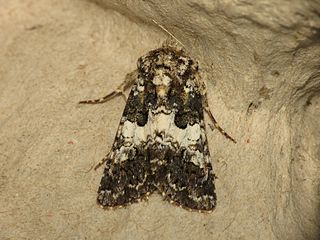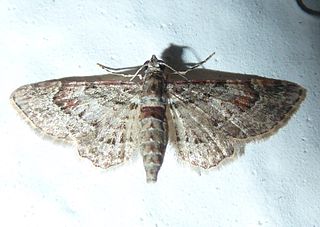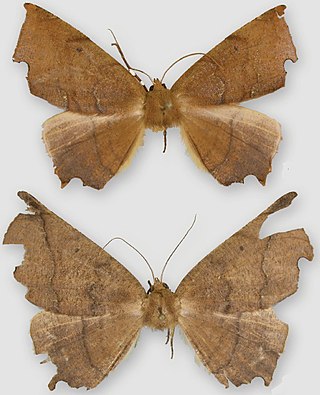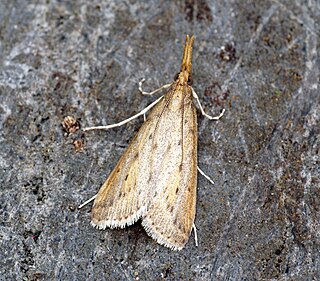Episcea is a genus of tiger moths in the family Erebidae. The genus was described by Warren in 1901.

Though small in absolute diversity of genera, the Hemitheini are nonetheless the largest tribes of geometer moths in the subfamily Geometrinae. Like most Geometrinae, they are small greenish "emerald moths". The tribe was first described by Charles Théophile Bruand d'Uzelle in 1846.
Mimudea is a genus of moths of the family Crambidae described by William Warren in 1892.

Hadena is a genus of moths of the family Noctuidae erected by Franz von Paula Schrank in 1802. About fifteen species are native to North America, while over one-hundred are distributed in the Palearctic realm.

Cyclophora is a genus of moths in the family Geometridae. Many species are referred to as mochas in reference to their colouration, primarily in Europe.

Iridopsis is a genus of moths in the family Geometridae first described by Warren in 1894.

Mesocolpia is a genus of moths in the family Geometridae.

Phyllodonta is a genus of moths in the family Geometridae described by Warren in 1894.

Problepsis is a genus of moths in the family Geometridae.

Somatina is a genus of moths in the family Geometridae first described by Achille Guenée in 1858.

Synchlora is a genus of moths in the family Geometridae erected by Achille Guenée in 1857. Adult Synchlora members often have leaf green wings, while larvae occasionally have the property of adorning themselves with pieces of plants in the pursuit of camouflage. The name of the genus comes from Greek, with "syn-" meaning "with", and "chlor" meaning "green".
Hadena sancta is a species of moth of the family Noctuidae. It is found in Spain, Corsica, Sardinia, Malta, North Africa, Israel, Lebanon, Syria, Jordan, Cyprus, Turkey, Saudi Arabia and Yemen.
William Warren was an English entomologist who specialised in Lepidoptera.

The Pericopina is a subtribe of tiger moths in the family Erebidae. The subtribe was described by Francis Walker in 1869.
Episcea extravagans is a moth of the family Erebidae. It was described by Warren in 1901. It is found in Brazil.

Luperina dumerilii, or Dumeril's rustic, is a moth of the family Noctuidae. The species was first described by Philogène Auguste Joseph Duponchel in 1826. It is found in the Mediterranean region and warmer areas of central and south-eastern Europe. Strays have been recorded from southern England. It is also present in Turkey and Jordan.

Schoenobiinae is a subfamily of the lepidopteran family Crambidae. The subfamily was described by Philogène Auguste Joseph Duponchel in 1846.

Margaroniini is a tribe of the species-rich subfamily Spilomelinae in the pyraloid moth family Crambidae. The tribe was erected by Charles Swinhoe and Everard Charles Cotes in 1889, originally as family Margaronidae.












